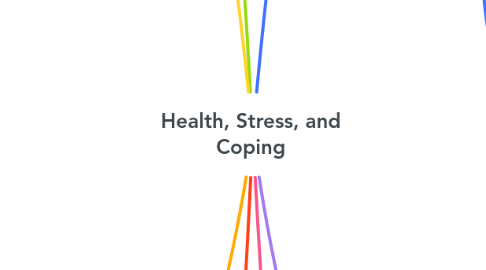
1. Health Psychology
1.1. **Health psychology** is dedicated to using behavioural principles to fight illness, and promote healthy life.
1.1.1. Refusal skills training
1.1.2. Community health campaigns
1.2. **Behavioural medicine** applies psychology to manage medical problems.
1.2.1. Behavioural risk factors
1.2.1.1. High levels of stress-smoking, avoidable accidents, untreated high blood pressure, and unsafe sexual behaviour.
1.2.1.2. **Disease prone personality** is associated with a pervasive negative mood, depression, anxiety, and irritability.
1.2.1.3. **Lifestyle Diseases** illnesses directly rerlated to behaviour
2. Learned Helplessness
2.1. **Learned helplessness** an acquired inabilit to covercome obsticles and avoid adversive stimuli.
2.2. Learned helplessness built upon a situation where they attribute failure to **lasting general factors**.
2.3. Often leads to **depression**: dispondency, heplessness, and hoplessness.
2.3.1. Depression can be "immunized" against by mastering difficult challenges.
2.4. Learned helplessness can be overcome by **mastery training** where person's reponses are reinforced that lead to mastering a threat or control over one's environment.
3. Stress and Health
3.1. Social Readjustment Rating Scale
3.1.1. Measured in **life change units**.
3.1.2. Risks
3.1.2.1. Highest Risk: Death of a spouce or child.
3.1.2.2. Middle Risk: Forclosure on a mortage or loan.
3.1.2.3. Lowest Risk: Minor violations of the law.
3.2. Daily life problems are more impactful than large events called **hassles** and **microstressors**.
3.3. **Psychosomatic disorder**: Psychological facors contribute to actual bodily damage.
3.4. **Hypocondriacs** only imagine they have diseases.
3.5. Aculturative Stress
3.5.1. **Assimilation**: Adopt new culture.
3.5.2. **Integration**: maintain old culture but participate in the new.
3.5.3. **Marginalization**: Reject the old but be rejected by the new.
3.5.4. **Separation**: Maintian old and avoid the new.
3.6. People can learn to control bodily activities via **biofeedback**.
3.7. **Cardiact Personality**: Both type A and B.
3.8. **Hardy** personalities are unusually resistance to stress. Feel like theyhave controls over their lives and work.
3.9. Stress Management
3.9.1. **Stress management** The application of cognative and behaviuoral strategies to reduce stress and improve coping skills.
3.9.2. **Social Suport** Close positive relationshsips with other people.
3.9.3. **Stress inoculation** Use of positive coping statements to control fear and anxiety.
3.9.4. **Coping statements** are reassuring, self-enhancing statements that are used to stop self-critical thinking.
4. Psychological Defense
4.1. **Defense Mechanism** is a habitual and often unconscious psychological process used to reduce anxiety.
5. Stress
5.1. Major behavioural risk factor, but necessary for adaptation to environment.
5.2. Reacting to stress is called **stress reaction**.
5.3. **General Adaptation Syndrome**
5.3.1. **Alarm Reaction** brings body to attention and moblizies resources.
5.3.2. **Resistence** is when the body adjusts to stress and is stabilizing.
5.3.3. **Exhaustion** stage is when the body has depleted is resources.
5.4. **Psychoneuroimunology** is the study of stress effects on the body.
5.5. Stress Experience
5.5.1. **Burnout** is a job related condition on mental, psysical, and emotions exhaustion.
5.5.1.1. Emotional exhaustion
5.5.1.2. Cynicism or detachment
5.5.1.3. Feelings of reduced personal accomplishment
5.5.2. **Stressor** is any condition or event that challenges or threatens a person.
5.5.3. **Pressure** is when a perosn is expected to meet an urgent demand or expectation.
5.5.4. Richard Lazarus' 2 steps in managing a threat.
5.5.4.1. **Primary Appraisal** in which a person decides if something is a threat.
5.5.4.2. **Seconday Appraisal** is the assessment of responcse and resources to be used.
5.5.5. **Frustration** is a negative emotional state expereinced when one is prrevented fom reaching a goal.
5.6. Stress Coping
5.6.1. **Emotion focused coping** is controlling the emotional reaction to a problem.
5.6.2. **Problem focused coping** is aimed at managing or directing the distressing siutation itself.
5.6.3. Coping with Tramatic Stress
5.6.3.1. Idenitfy feelings and talk to others.
5.6.3.2. Think about skills thtahave helped you overcome before.
5.6.3.3. Continue to do things you enjoy.
5.6.3.4. Get support
5.6.3.5. Take time to heal
6. **Frustration** is a negative emotional state that occurs when people from reaching their desired goals.
6.1. **External frustration** is based upon obsticles.
6.2. **Personal frustration** is based on personal characteristics.
6.3. **Frustration** can become displaced becuase its not socially acceptial to be aggressive.
6.4. **Escape** is simply abandoning the siutation.
6.5. When faced with frustration ask yourself...
6.5.1. internal or external?
6.5.2. Can the source of the frustration be changed?
6.5.3. Is it worth the effort?
7. Conflict
7.1. Conflict-types
7.1.1. **Approach-Approach** conflict is choosing between 2 positive or desirable alternatives.
7.1.2. **Approach-avoidance** is an attractive and repelling by the same goal and activity.
7.1.3. **Avoidance-Avoidance** is choosing between 2 undesireable alternatives.
7.1.4. **Double Approach-Avoidance** simultaniously attracted and repelled by each of the 2 charatcteristics.
7.1.5. **Multiple Approach-Avoidance** is being simultaniously attracted to and replled by each of several alternatives.
7.2. Managing Conflict
7.2.1. Don't be hasty in making important decisions.
7.2.2. Try out important decision partially whne possible.
7.2.3. Look for workable compromises.
7.2.4. Make a decisions and stick with it.
